
Kazi Nazrul Islam was a Bengali poet, short story writer, journalist, lyricist and musician. He is the national poet of Bangladesh. Nazrul produced a large body of poetry, music, messages, novels, and stories with themes, that included equality, justice, anti-imperialism, humanity, rebellion against oppression and religious devotion. Nazrul Islam's activism for political and social justice as well as writing a poem titled as "Bidrohī", meaning "the rebel" in Bengali, earned him the title of "Bidrohī Kôbi". His compositions form the avant-garde music genre of Nazrul Gīti.
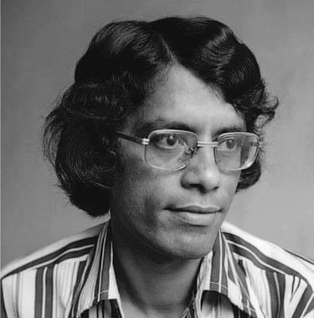
Humayun Azad was a Bangladeshi poet, novelist, short-story writer, critic, linguist, columnist and professor of Dhaka University. He wrote more than sixty titles. He was awarded the Bangla Academy Literary Award in 1986 for his contributions to Bengali linguistics. In 2012, the government of Bangladesh honored him with Ekushey Padak posthumously for his contributions to Bengali literature.

Humayun Ahmed was a Bangladeshi novelist, dramatist, screenwriter, filmmaker, songwriter, scholar, and academic. His breakthrough was his debut novel Nondito Noroke published in 1972. He wrote over 200 fiction and non-fiction books. He was one of the most popular authors and filmmakers in post-independence Bangladesh. Pakistani English newspaper Dawn referred to him as the cultural legend of Bangladesh.

Shamsur Rahman was a Bangladeshi poet, columnist and journalist. A prolific writer, Rahman produced more than sixty books of poetry collection and is considered a key figure in Bengali literature from the latter half of the 20th century. He was regarded as the unofficial poet laureate of Bangladesh. Major themes in his poetry and writings include liberal humanism, human relations, romanticised rebellion of youth, the emergence of and consequent events in Bangladesh, and opposition to religious fundamentalism.

Rudra Mohammad Shahidullah was a Bangladeshi poet noted for his revolutionary and romantic poetry. He is considered one of the leading Bengali poets of the 1970s. He received Munir Chaudhury Memorial Award in 1980 and Ekushey Padak in 2024

Netrokona is a district of the Mymensingh Division in north-east of Bangladesh.
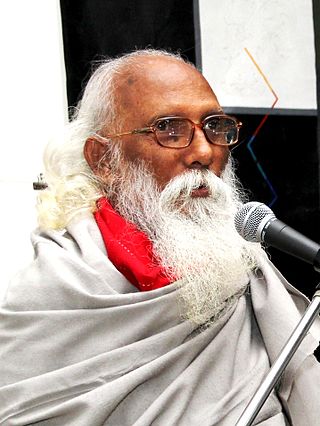
Nirmalendu Goon is a Bangladeshi poet known for his accessible verse. He was awarded Ekushey Padak in 2001 and Independence Day Award by the Government of Bangladesh in 2016. He was also awarded the Bangla Academy Literary Award in 1982.
Abdul Gaffar Choudhury was a Bangladeshi-born British writer, journalist, columnist, political analyst and poet. He wrote the lyrics to "Amar Bhaier Rokte Rangano", a widely celebrated song commemorating the Bengali Language Movement. He was awarded Bangla Academy Literary Award in 1967, Ekushey Padak in 1983, and Independence Day Award in 2009.
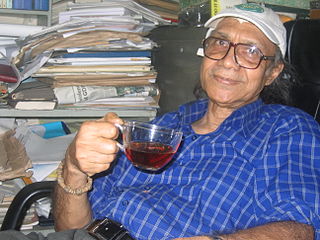
Abdul Mannan Syed was a Bangladeshi poet, and critic. He is known for his considerable research works on Kazi Nazrul Islam, Jibanananda Das, Farrukh Ahmad, Syed Waliullah, Manik Bandyopadhyay, Bishnu De, Samar Sen, Roquiah Sakhawat Hossain, Abdul Ghani Hazari, Muhammad Wajed Ali, Prabodh Chandra Sen. From 2002 to 2004, he held the position of Executive Director of Nazrul Institute.

Mohammad Rafiq was a Bangladeshi poet. He was awarded Bangla Academy Literary Award in 1987 and Ekushey Padak in 2010.

Rafiq Azad was a Bangladeshi poet, editor and writer. He is credited with 45 collections of poetry including Prakriti O Premer Kabita, Asambhaber Paye, Sahasra Sundar, Haturir Nichae Jiban, Khub Beshi Durea Noy, Khamakaro Bahaman Hey Udar Amiyo Batas and others. He is most well known for his poem "Bhaat De Haramjada" which was written during the famine of 1974. The poet participated in the war against Pakistani forces in the Bangladesh Liberation War of 1971 and was awarded ‘Notable Freedom Fighter Award' in 1997. He received Bangla Academy Literary Award in 1984 and national award Ekushey Padak in 2013 for his contribution to Bangla language and literature.
Nurul Momen was a Bangladeshi playwright, educator, director, broadcast personality, orator, humorist, dramatist, academician, satirist, belletrist, essayist, columnist, translator and poet. He served as a faculty member in the capacities of professor and dean at the faculty of Law in the University of Dhaka. He also served as a lawyer. He is called "Father of Bangladeshi theatre" and "Natyaguru" of Bangladesh. He was awarded the Bangla Academy Award in 1961. He was also honoured by the People's Republic of Bangladesh with the Ekushey Padak in 1978.

Bimal Guha is a Bangladeshi poet. He appeared on the Bangladesh literary scene in the 1970s. His themes revolve around the war of liberation and the eternal subjects of love, nature, motherland, mother-tongue, tradition, and modernity.

Kaiser Hamidul Haq is a Bangladeshi translator, critic and academic. Known for his translations from Bengali into English, Haq is a recipient of Bangla Academy Literary Award (2013) in the category of translation. He is a former professor of English at the University of Dhaka. In the liberation war of Bangladesh, he fought against Pakistani Army "as a freshly commissioned subaltern in command of a company".
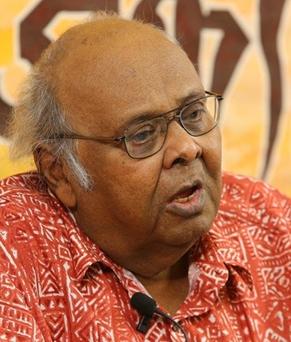
Shahid Quadri was a Bangladeshi poet and writer. For his poetry, he was awarded Bangla Academy Literary Award in 1973 and Ekushey Padak in 2011. His notable poems include "Uttoradhikar", "Tomake Obhibadon Priyotoma", "Kothao Kono Krondon Nei" and "Amar Chumbongulo Poucchey Dao".
Haroon Habib is a writer, journalist and columnist of Bangladesh who is well known for his bold independent writings. A powerful voice in journalism, creative writings and social activism for last three and half decades, he took part in the country's Liberation War in 1971 as a student guerrilla fighter and simultaneously worked as war correspondent of the Joy Bangla weekly and Swadhin Bangla Beter Kendra radio, the two official mouthpieces of the provisional Mujibnagar government, that led the country's independence war.
Abdul Hye Sikder is a Bangladeshi poet. He is a former executive director of Nazrul Institute and vice president of Jatiya Nazrul Samaj. He received the Bangla Academy Literary Award in 2003.
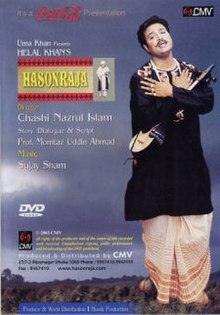
Hason Raja is a Bangladeshi Bengali film directed by Chashi Nazrul Islam and produced by actor Helal Khan. This film is based on the biography of poet and philosopher of Bangladesh Hason Raja This film was released in Bangladesh, the UK and the USA on 17 August 2002 and won National Film Awards in best film category and other six categories.
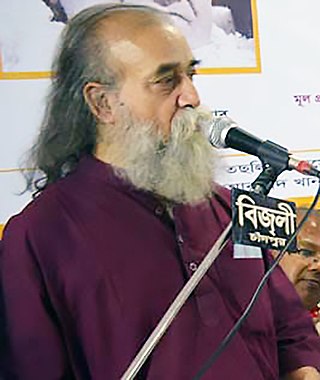
Asim Saha was a Bangladeshi poet and novelist. He received Bangla Academy Literary Award in 2011 for his contributions to poetry. In recognition of his contribution to Bengali language and literature, the government of Bangladesh awarded him the country's second-highest civilian award Ekushey Padak in 2019.
Khalekdad Chowdhury, also known by pen names Shahadat Chowdhury and Atashbaz, is a reputed Bangladeshi writer, playwright and novelist. In recognition of his contribution to Bengali language and literature, the government of Bangladesh posthumously awarded him the country's second highest civilian award Ekushey Padak in 2018.















